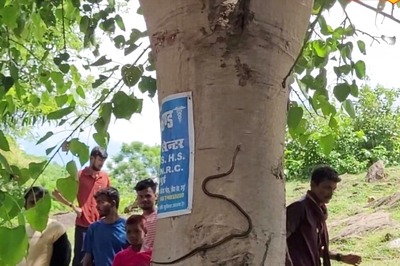
views
When Partition talks were on, Jinnah’s opening position was simple. Where Muslims are a majority, the other minorities should not get a choice as to which country they would join, but where non-Muslims are a majority, either Muslim bantustans must be carved out with geographical contiguity provided, irrespective of the wishes of those living in these contiguity corridors, or Muslims get a veto on where they would like to stay. That gambit failed then. But 74 years after Partition, it seems Jinnah’s opening gambit has largely succeeded, thanks to India’s ‘intellectual elite’.
The classic example of this is Kashmir. Thanks to the normalisation of rampant communalism, the whitewashing of ethnocide and the politics of pandering, today, when we refer to the “wishes of the Kashmiri people”, the reference is exclusively to its Sunni majority. As a rule, for the last few decades, the wishes of the Shias, the Pandits, the Ladakhi Muslims and the Buddhists have been straitjacketed, based on the desires of just one community.
In many ways, this trend kicked off with Sheikh Abdullah. Curiously, it was the same Sheikh Abdullah who opposed Jinnah’s ‘Muslim majority states must automatically become part of Pakistan’ formula and then invariably gravitated towards the formula due to politics. Once Article 370 of the Constitution came into effect in Kashmir, Nehru almost immediately started whittling away the autonomy provisions. Obviously, unsatisfied with this, Abdullah started playing the two-timing games he was notorious for, including contacting foreign governments and broaching the subject of independence.
Unsurprisingly, Nehru locked up Abdullah and threw away the keys for 11 years. However, during this period, the power of religious heads like Mirwaiz Mohammad Farooq was on the rise and Abdullah, in and out of jail, wanted to be known as the sole representative of Kashmir (hence, the laughable honorific “Sher E Kashmir” bestowed on him years earlier). This led to what are now known as the “Sher-Bakra” riots—clashes between the followers of Abdullah (sher) and Mirwaiz (Bakra or goat, owing to their beards). Some scholars claim this to be proof of Abdullah’s ‘secular’ credentials, battling off regressive mullahs—far from it, it was merely power play to become the ‘sole spokesman’ of the Sunnis, a demand that echoed Jinnah’s earlier call to be the sole spokesman of Indian Muslims.
The situation suited everyone involved, from Nehru to Abdullah. Nehru, because he could blame his own bungling on Abdullah while playing divide and rule in Kashmir, and Abdullah could palm off his demagoguery sans accountability on Nehru. In the backdrop of this Punch and Judy show, slow and steady seizure of lands from Pandit landowners and their redistribution to Abdullah’s cadres, as and when he could, continued.
Needless to say, the majority of funding given to Kashmir was on account of Ladakh’s considerable surface area, while all of it was siphoned off (irrespective of who ran Kashmir) into placating Sunnis of Kashmir valley, at the cost of both Jammu and Ladakh. At this time, serious tensions between the Shias and the Sunnis were latent, given the main Shia power Iran was underlaying religion, instead of being a bulwark against the Soviet Union, while the main Sunni power Saudi Arabia was playing second fiddle (the other great Sunni power Egypt was busy with its own demagogues and socialism). However, as the Iranian Revolution led to internecine Shia-Sunni conflict, Shias too slowly started getting othered in Kashmir’s polity.
It was in this charged background that the Soviet defeat in Afghanistan freed up Mujahideens to fight in Kashmir, triggering insurgency. It had everything to do with Sunni majoritarianism and nothing whatsoever to do with ‘alienation’ and the ‘whittling away of 370’ (most of which was done by Nehru). The clearest indication of this was the fact that the ethnic cleansing of Kashmiri Pandits began almost simultaneously while Kashmiri Shias were effectively now seen as agents of the Indian state, frequently labelled “mukhbir” (informer). Much of India’s ‘intelligentsia’ lovingly lapped up this narrative and either whitewashed or normalised the ethnocide, keeping the centripetal forces of Sunni majoritarianism alive. Why? Simply because the parties that benefitted from the ‘alienation of Kashmir’—essentially profiting from victimhood politics—were also the biggest dispersers of goodies for this ‘intelligentsia’.
Today as we stand, it is worth considering if the Indian state has lost the narrative battle so badly that the default “accepted solution” to Kashmir is exactly what Jinnah espoused 74 years ago. That tyrant Sunni majoritarianism must be mollycoddled and that anybody who stands in the way or disagrees can take both the proverbial and literal hike. What is even more worrying is that the same ‘intelligentsia’ who have normalised Jinnah’s dream are the ones who are celebrated as interlocutors of India abroad.
The question we need to ask is: can we reverse this? Or, does anyone in power even realise that this is how far we have strayed in order to begin reversing this process?
The writer is a Senior Fellow at the Institute of Peace and Conflict Studies. The views expressed in this article are those of the author and do not represent the stand of this publication.
Read all the Latest Opinions here

















Comments
0 comment